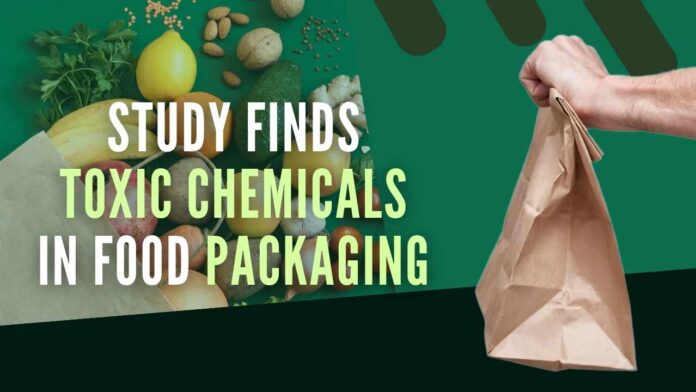
Study finds toxic chemicals in food packaging
Paper bags and compostable paper bowls that carry the delicacies could be high on forever chemicals — harmful for both human health and the environment, warns a study led by an international team of researchers.
These chemicals are also called forever chemicals because they break down very slowly and accumulate in the environment and human tissue, including the liver.
Amid the ban on single-use plastic, paper bags, and compostable food containers has found many takers. While marketed as “acegreen” alternatives to plastic, these contain a chemical called perfluooctane sulfate or PFOS, which is one of a class of man-made chemicals called per- and poly-fluoroalkyl substances, or PFAS.
PFAS are commonly used to make paper grease-resistant, so they are used in many fast-food containers and wrappers.
The researchers from Canada, the US, and Switzerland tested 42 kinds of paper food packaging collected in Toronto between February and March 2020, including compostable paper bowls, sandwich and burger wrappers, popcorn serving bags, and bags for desserts such as doughnuts.
The team tested the paper food packaging for fluorine — a key element in PFAS — and found that 45 percent of the samples contained fluorine, suggesting they contained PFAS.
The results, published in the journal Environmental Science and Technology Letters, showed that the highest levels of fluorine and PFAS were found in paper bags used for greasy items such as burgers, pastries, and doughnuts, as well as in compostable paper bowls.
It was because the raw pulp needs to be mixed with a lot of PFAS to make it strong enough and prevent disintegration when it comes in contact with liquids, the researchers said.
“The use of PFAS in food packaging such as “compostable” bowls represents a regrettable substitution of single-use plastic food packaging,” the study showed.
The researchers said that PFAS are known to get into food from the packaging that holds the food.
“It’s getting into you because the PFAS will migrate from the packaging, from the bowl, from the bag into the food,” Miriam Diamond, Professor at the School of the Environment at the University of Toronto, was quoted as saying to the CBC News. Previous studies have shown that it happens more quickly when food is hot and greasy, she added.
The paper bag and compostable bowl samples also showed the presence of another PFAS, known to be toxic to rodents.
Previous studies have linked PFAS to a variety of health effects in humans and animals, including increased risk of cancers, reduced immune response and fertility, altered metabolism, and increased risk of obesity.
[With Inputs from IANS]
PGurus is now on Telegram. Click here to join our channel and stay updated with all the latest news and views
For all the latest updates, download PGurus App.
- JP Morgan CEO lauds economic reforms by Modi govt; says PM Modi lifted 400 mn people out of poverty - April 24, 2024
- India, Japan hold talks on Disarmament, Non-Proliferation and Export Control - April 24, 2024
- After backlash over Sam Pitroda’s inheritance tax comment, Congress distances itself saying his views not always aligned with party - April 24, 2024







